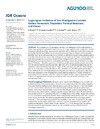Please use this identifier to cite or link to this item:
https://accedacris.ulpgc.es/jspui/handle/10553/70116
| Title: | Lagrangian Evolution of Two Madagascar Cyclonic Eddies: Geometric Properties, Vertical Structure, and Fluxes | Authors: | Morris, T. Aguiar González, Miguel Borja Ansorge, I. Hermes, J. |
UNESCO Clasification: | 251007 Oceanografía física | Keywords: | Madagascar cyclonic eddies 3-D Lagrangian evolution |
Issue Date: | 2019 | Journal: | Journal of geophysical research. Oceans | Abstract: | We investigate the 3-D Lagrangian evolution of two Madagascar cyclonic eddies based on ad hoc Argo experiments undertaken in April and July 2013. Eight Argo floats were configured to measure temperature and salinity at high temporal resolutions (daily and five-daily experiments) and varying park depths (300, 500, 650, and 1,000 m) to test their performance with regard to retention within the eddies described. Near-surface eddy properties are derived from an eddy detection and tracking algorithm applied to satellite altimetry data and a quasi eddy-resolving (1/4°) ocean general circulation model (GLORYS2v4). Both eddies propagated southwestward from southwest Madagascar (26°S, 40°E), where the South East Madagascar Current separates from the continental shelf. During a travel of about 130 days at an average speed of 11 km day−1, the eddies experienced well-defined growth, mature, and decay phases, interacting with the Agulhas Current at the KwaZulu-Natal Bight (28°S, 34°E). Model-based estimates indicate the April (July) eddy showed mean trapping water depths of 595 ± 294 m (914 m ± 107 m), volume transport about 13.4 ± 5.2 Sv (21.2 ± 9.1 Sv), heat flux of −0.07 ± 0.06 PW (-0.2 ± 0.09 PW), and freshwater flux of 0.04 ± 0.04 Sv (0.09 ± 0.05 Sv). Peak estimates were found for both eddies during the mature eddy phase. These results highlight the role of Madagascar cyclonic eddies as transporters of cooled and freshened source waters into the Agulhas Current and illustrate the benefits of ad hoc Argo configurations for the study of 3-D Lagrangian eddy dynamics in combination with a “state-of-the-art” ocean model and remotely sensed data. | URI: | https://accedacris.ulpgc.es/handle/10553/70116 | ISSN: | 2169-9275 | DOI: | 10.1029/2019JC015090 | Source: | Journal of Geophysical Research: Oceans [ISSN 2169-9275], v. 124 (11), p. 8193-8218 |
| Appears in Collections: | Artículos |
SCOPUSTM
Citations
4
checked on Jun 8, 2025
WEB OF SCIENCETM
Citations
5
checked on Feb 22, 2026
Page view(s)
80
checked on Jan 10, 2026
Download(s)
152
checked on Jan 10, 2026
Google ScholarTM
Check
Altmetric
Share
Export metadata
Items in accedaCRIS are protected by copyright, with all rights reserved, unless otherwise indicated.
